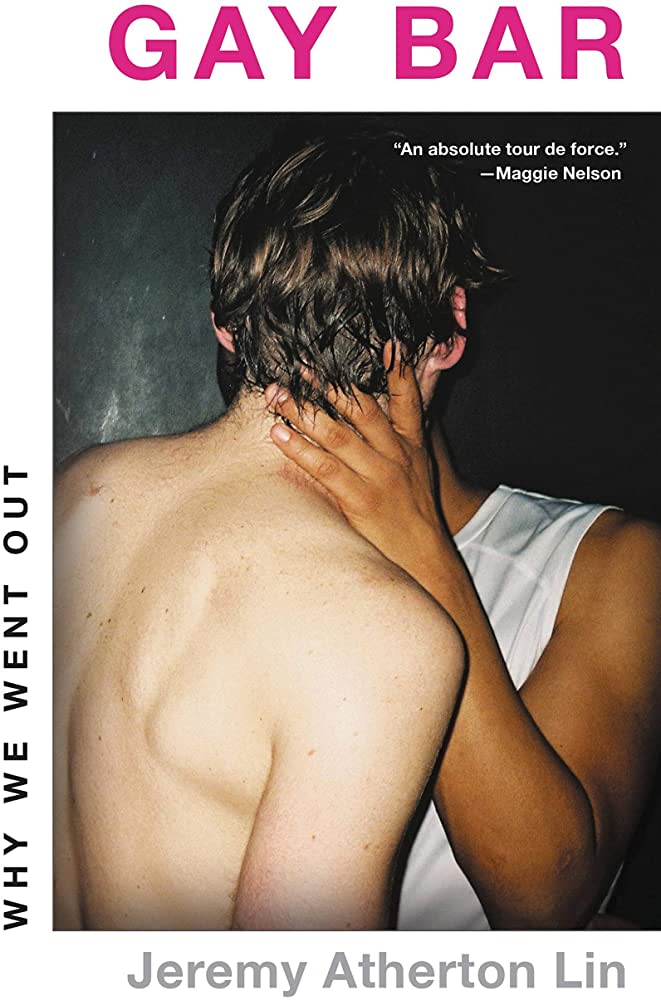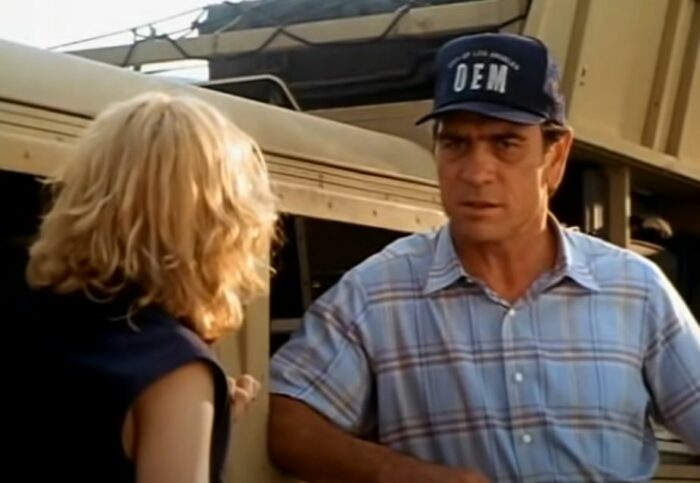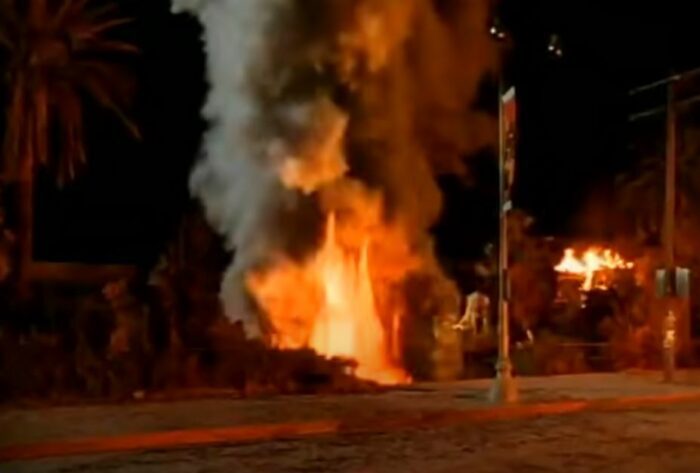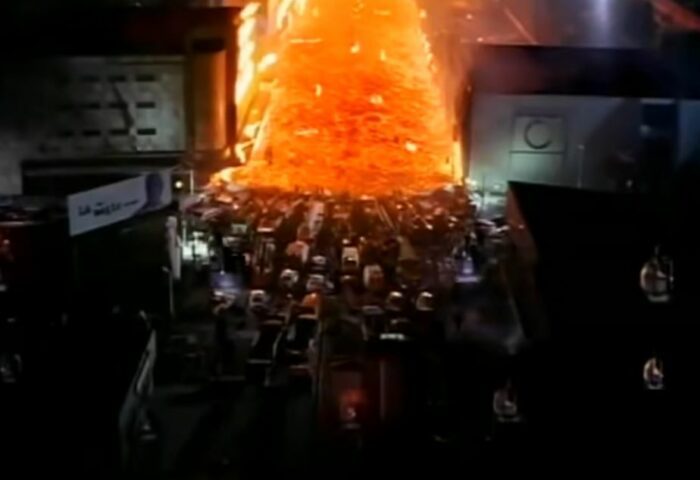Welcome back! It’s time for some staff recommendations. This month, Caemeron encourages you to catch up on Hello Tomorrow! on Apple TV+, Christopher has been reading Gay Bar: Why We Went Out by Jeremy Atherton Lin, and Cat spills a lot of virtual ink singing the praises of the 1997 disaster movie Volcano. Honestly, after reading Cat’s entry I want to watch it now. And that’s the point!
What have you been into lately? Let us know in the comments!
TV Recommendation: Hello Tomorrow!
Caemeron: Hello Tomorrow! seems to have largely flown under the radar, which I think is a shame. Perhaps it’s because the reviews when it came out weren’t very positive, saying it was more style than substance, or just not that interesting. I remember reading things like that, anyway, because they factored into my decision to write on the show weekly instead of just hitting the premiere. I seemed to be liking this show more than others who write things about television, so I thought I should keep on with it, advocating that you watch the show to some degree just by covering it.

And I’m glad I stuck with it, as in my estimation Hello Tomorrow! has just gotten better and better. I’ve loved the style from the beginning. It’s billed as retro-futuristic, with the general vibe being along the lines of 1950s TV, but with robots and hovercars. Mark Mothersbaugh provides the score, which is on point, and the whole thing just sucked me in from the get-go. It’s got some dark humor going on, too.
But now, as the season finale approaches, I find myself thinking Hello Tomorrow! is truly noteworthy TV and I want to urge you to watch it. Catch up over the next two weeks (you can read my articles along the way!) and you can be on time for the end of the season on April 7.
I can see why the show didn’t catch on with some critics, as it might take until the back half of the season for you to feel you’re watching something that’s truly of substance. But it gets there, and the episodes are only a half hour, so we’re not talking about a huge amount of time. The structure of it actually serves the series well, as it allows the surface to fold into something deeper.
I’ve veered into abstraction. Sorry! The point is this show is a lot of fun, and more! It features Billy Crudup, Alison Pill, Hank Azaria, and other familiar faces. Go to Apple TV+ and check it out.
Book Recommendation: Gay Bar: Why We Went Out, by Jeremy Atherton Lin
Christopher: Jeremy Atherton Lin takes narrative non-fiction to dizzying new heights in Gay Bar, a candid history of gay bars in London, Los Angeles, and San Francisco. Like the institutions themselves, the book is sordid, romantic, euphoric, and tragic all at once.
I especially recommend this book to fellow Gen Z queers. Our history and language must never be lost to us. Amid the vivid tableaus and historic digressions, Lin explores the multiplicity of “gay”; speaking for myself, I felt some of the walls I had built around my identity fall down. This is one of those rare books that could actually change your life.
Lin is also immensely generous with sharing his personal experiences. It’s probably because of this that his writing is so compelling. The glue that holds Gay Bar together is the romance between Lin and his boyfriend; my lasting impression as I closed the final page was that I had just read a love story unlike any I’ll ever read again.

Film Recommendation: Volcano (1997)
Cat: Here’s why I like the movie Volcano. Yes, the professor of the geology class I was taking in college at the time made a point of explaining to us why the movie was geologically impossible. Yes, it’s a big dumb disaster movie (which was still more entertaining than Dante’s Peak, which came out at the same time and was more scientifically accurate, and I really wanted to like it, and yet…).
First of all—character actors on parade. For all that Tommy Lee Jones in his heyday was doing his particular breed of leading man thing, he’s really a character actor. Keith David, Don Cheadle, John Carroll Lynch, The West Wing’s Richard Schiff in a small role, Deadwood’s Dayton Callie…bring ‘em on. And the effects from 1997 hold up, and I don’t know my LA geography, but I don’t remember any loud complaining from locals at the time like we New Yorkers were doing after that very cool but wildly inaccurate shot from Independence Day (The Empire State Building is on a CORNER, for god’s sake, that shot of it being blown up from up an avenue is very cool but geographically impossible). They also don’t do anything stupid like bother with a romance between the male and female leads—there’s enough chemistry with Mike Roark and geologist Amy Barnes that you figure some sort of post-volcano relationship could happen later, but it doesn’t interrupt the movie. It’s also clever of them to use newscasters as narration throughout, and if you don’t tell me one of your favorite parts is the small dog running back into the house to rescue his toy bone from the lava, I will not believe you (that’s it, boy, bark at the lava! That will totally help!).

No, the real reason I like the movie is that it’s a celebration of blue-collar workers, and people getting over their own egos to do what’s important in a crisis. I wasn’t personally on the ground in NYC during 9/11, but a bunch of my friends were there (several worked downtown, a few escaping death on the pure luck of late trains or the like), and the big vibe that was in the air in the middle of all the terror was people’s need to help each other. My friends tried to find somewhere to go donate blood, and most of the places already had lines ’round the block. Those of us stuck at home were doing early-days-of-internet online things and phone trees to check on our loved ones and provide crash space for anyone who didn’t have power at home.
I WAS in Manhattan for the big east coast blackout in 2003, and same thing—nobody freaked, everyone was helping, stores were giving away water and comfortable shoes to the people who had to walk over bridges to get home (I was one of them—walking over the Queensboro bridge is scary, y’all). New Yorkers are cool…but I digress.

I don’t know LA. I’ve been there and I enjoy it, but I don’t know it, so I can’t speak to the whole “Los Angelenos help each other in a crisis” question. But in the movie, that’s what happens. And it’s not the LA that you usually see in the movies. It’s blue-collar LA. It’s the guys who keep the subway trains running, the firemen, the LAPD (who didn’t have the best reputation after Rodney King, who is mentioned in the movie), and the Office of Emergency Management. And yes, there are doctors and scientists, and journalists. But the real heroes of this movie are a whole bunch of people who probably didn’t go to four-year colleges. Trade school appreciation, yo.
Mike Roark is in charge because someone has to be. I appreciate the hell out of Mike—he’s one of those “do the job” guys, even at the expense of his being a dad (in fairness, I don’t know if I could do that, so, more respect to him). When his own kid gets a minor injury from the burgeoning volcano, he sends her off with a doctor he just met to get seen, because he has to stay in the thick of it and take care of things. He’s on leave to spend time with his daughter, but the shit is hitting the fan, and it’s still his job. He doesn’t hesitate. It sucks for a parent, and his daughter hates him for it, but over the course of the movie she gradually learns what he knows, that this thing was bigger than her, and by the end of it, she’s proud of him. Probably be in therapy for the rest of her life from the volcano, but proud of her dad.

It makes sense that the Office of Emergency Management should exist. With something like this, or any disaster, when you have to use every resource you have, someone has to be in charge, or nothing will get done because of a “too many cooks” situation. Before Mike shows up, we’ve got the Fire Chief and a construction supervisor arguing over how to proceed, plus rescue efforts prioritizing museums over neighborhoods (though the exchange about how heavy the work of Hieronymus Bosch is is funny). Everyone’s input is valuable to Mike, and I love how early on before everything goes crazy, his first impulse is for someone to find him a geologist who can tell him exactly what is going on under MacArthur Park. A middle-aged, blue-collar cishet white man, actually listening to a scientist? Who’s a woman? My goodness.
Mike’s best quote is when he’s telling the other, for want of a better term, department heads, his somewhat insane plan to do a precision drop of a building to redirect the lava into a trench and out into the ocean. “We’re going to put as many people in front of it as it takes. Listen up, people! Let me tell you what’s south of us: no more museums, no more department stores, just homes! People! If we turn and run now, they’re going to be defenseless! You don’t like my plan? That’s good. Give me another plan, but don’t tell me we’re backing out!” I’m told I have a bit of a Tommy Lee Jones/Mike Ehrmentraut vibe to me when I manage things. I’m good with that.
Probably one of the more famous exchanges is between Kevin from the neighborhood and Jerry the obnoxious cop. Kevin comes running into where everyone is trying to dam the lava and tries to persuade someone to send a fire truck or two down his street, which is, you know, on fire. The cops are busy and blow him off, Kevin persists, and Terry slaps cuffs on him (even Terry’s partner Bud is like, um, what? You’re doing an arrest in the middle of this? Come on). When Bud releases Kevin because the whole thing is ridiculous (both cops are white, but it’s just Terry with the ‘tude), Kevin is first, “I’m supposed to say thank you?” Bud has no time for this either, though, says no, and goes back to work. Kevin has a Capital M Moment, then says, “you stop this shit, it stays out the neighborhood?” And then he moves Terry over, and the two of them work side by side to lift the k-rail that needed a lot of people, Kevin included, to move it. There’s a bit of an awkward moment after, and then Terry goes over to the Fire Chief and tells him they need some trucks in Kevin’s neighborhood. Bud and Kevin do a handshake before Kevin rides out with the FD, and Kevin and Terry exchange a look that says a lot. Dick, racist dick, whichever…the point is that he got over it. Everyone gets over their personal shit and works together for the greater good, and I dig that. Should Terry not have been a dick in the first place? Of course, he shouldn’t have. But movies have conflict, and what matters is that he eventually got there.
The Big Hero Death of the film gets to go to John Carroll Lynch, who’s in charge of the subway situation. At the start of the film, he’s this world-weary guy covered in nicotine patches from trying to quit smoking. When they lose contact with a train car in one of the affected tunnels, he gets a team together and goes down to look. The whole gag of the movie is that the subway was what got the city into trouble—it’s a bad idea to build a subway under land that’s seismically active. The car is filled with smoke and there’s lava creeping up under it, but the crew gets all the unconscious passengers out…except the driver. And Stan (that’s Lynch) won’t leave him. And you know it’s a suicide mission, but it’s heroic and badass as hell, as he carries the guy through the car, muttering Hail Marys the whole time, and then when the lava has overtaken the car and he can’t get out, he jumps into the lava, sacrificing himself to close the distance so he can hurl the body of the driver to safety. The Terminator 2 “thumbs-up” at the last as he melts into the lava is a little precious (it was precious when the Terminator did it, and it’s not like he was feeling the horrible pain that Stan was feeling), but it’s earned, so rock on, son.
Class lines get kind of erased in this movie too. The doctor Mike sent his daughter off with is Jacqueline Kim, and it’s established at the beginning that her zillionaire husband is a douchebag self-important white guy who wants his wife “treating tennis elbows, not gunshot wounds.” She’s doing her thing, up to her elbows in burn victims, he comes in and tries to persuade her away, and she basically tells him to screw himself because she’s got the right priorities. And then his “lifelong dream” of his enormous building that was being erected gets demolished to help stop the lava, so neener neener neener.
Speaking of a little precious, I would never ever say that the end of the movie (and there’s been a whole lot of terribly butch “I won’t leave a man behind so I’ll stay here and die with you, or at least die in the process of trying to save you” stuff—and please don’t think I’m making light of that sort of thing, not all heroes wear capes) doesn’t get a little heavy-handed with the whole message thing. It’s a nice message and I like it, but still. The little kid who has been almost crushed by the building coming down is asked by the cop who wants to help him find his mom, “what does she look like?” And the kid, all wide-eyed innocence, looks around at all the people covered in mud and volcanic ash, and says “look at their faces. They all look the same.” The cop is Keith David, and he gets the gravity of that, even if the kid doesn’t, and yes, it’s great—but there’s me, going, peace and racial harmony through dirt! Why didn’t you say so?
So anyway—that’s why I like Volcano. Yeah, it’s a big dumb disaster movie. But it’s fun, it’s got some heart, and the lesson is that when life sends you lava, you should bark at it.


